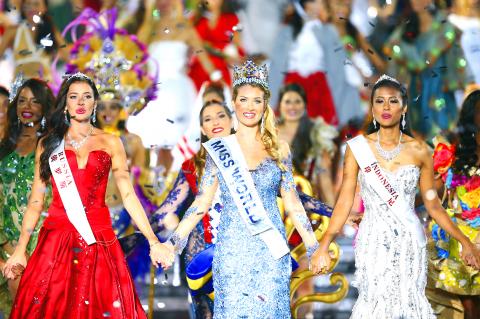Spain’s Mireia Lalaguna Royo was named the winner of the Miss World 2015 competition on Saturday night in the southern Chinese island resort of Sanya, an event dogged by controversy over China’s refusal to allow Canada’s entrant to attend.
Sofia Nikitchuk of Russia was the runner-up and Indonesia’s Maria Harfanti took third place in the final following a lengthy competition featuring 114 women.
Each had won the right to represent their country in a series of local and regional competitions.

Photo: AP
The victory marked the first-ever win for a Spanish contestant.
Lalaguna is a 23-year-old model from Barcelona with a degree in pharmacology who plans to pursue a master’s degree in nutrition. She placed first in the competition’s top model contest and appeared to impress the judges with her public speaking.
Not present was Miss Canada, Chinese-born Anastasia Lin (林耶凡), who had been prevented from boarding her connecting flight to Sanya from Hong Kong last month after China refused her a visa.
Lin is an outspoken critic of Chinese religious policy and a follower of the Falun Gong meditation practice, which was outlawed by China in 1999.
She said that after she won the Canadian title, Chinese security agents visited her father, who still lives in China, in an apparent attempt to intimidate her into silence.
China has hosted the competition seven times, starting in 2003, part of its attempts to project a more modern, outgoing image.
However, the controversy over Lin’s attendance illustrates the authoritarian communist government’s determination to do so on its own terms, regardless of the cost to the country’s reputation.
Neither Beijing nor the London-based Miss World Organization has commented on the controversy.
It was the second consecutive year that outside events intruded on the competition. Last year’s contest in London was marred by the murder the month before of Miss Honduras and her sister in that country.
The first Miss World contest was held 64 years ago in Britain.

Drug lord Jose Adolfo Macias Villamar, alias “Fito,” was Ecuador’s most-wanted fugitive before his arrest on Wednesday, more than a year after he escaped prison from where he commanded the country’s leading criminal gang. The former taxi driver turned crime boss became the prime target of law enforcement early last year after escaping from a prison in the southwestern port of Guayaquil. Ecuadoran President Daniel Noboa’s government released “wanted” posters with images of his face and offered US$1 million for information leading to his capture. In a country plagued by crime, members of Fito’s gang, Los Choneros, have responded with violence, using car

CYBERCRIME, TRAFFICKING: A ‘pattern of state failures’ allowed the billion-dollar industry to flourish, including failures to investigate human rights abuses, it said Human rights group Amnesty International yesterday accused Cambodia’s government of “deliberately ignoring” abuses by cybercrime gangs that have trafficked people from across the world, including children, into slavery at brutal scam compounds. The London-based group said in a report that it had identified 53 scam centers and dozens more suspected sites across the country, including in the Southeast Asian nation’s capital, Phnom Penh. The prison-like compounds were ringed by high fences with razor wire, guarded by armed men and staffed by trafficking victims forced to defraud people across the globe, with those inside subjected to punishments including shocks from electric batons, confinement

The team behind the long-awaited Vera Rubin Observatory in Chile yesterday published their first images, revealing breathtaking views of star-forming regions as well as distant galaxies. More than two decades in the making, the giant US-funded telescope sits perched at the summit of Cerro Pachon in central Chile, where dark skies and dry air provide ideal conditions for observing the cosmos. One of the debut images is a composite of 678 exposures taken over just seven hours, capturing the Trifid Nebula and the Lagoon Nebula — both several thousand light-years from Earth — glowing in vivid pinks against orange-red backdrops. The new image

Canada and the EU on Monday signed a defense and security pact as the transatlantic partners seek to better confront Russia, with worries over Washington’s reliability under US President Donald Trump. The deal was announced after a summit in Brussels between Canadian Prime Minister Mark Carney and European Commission President Ursula von der Leyen and European Council President Antonio Costa. “While NATO remains the cornerstone of our collective defense, this partnership will allow us to strengthen our preparedness ... to invest more and to invest smarter,” Costa told a news conference. “It opens new opportunities for companies on both sides of the